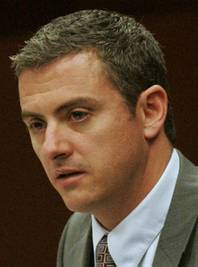Thursday, April 21, 2011 | 2 a.m.

Andrew Clinger

Pete Goicoechea
Sun archives
- Shelley Berkley admonishes Nevada lawmakers not to gut education (4-20-2011)
- First public budget debate before full Assembly ends in predictable stalemate (4-20-2011)
- New style of budgeting — probably not a new result (4-17-2011)
- Democrats take budget fight out of money committees, bring it to the floors of the Assembly and Senate (4-11-2011)
- Raggio-style deal-making a no-go this time (4-3-2011)
- Horsford doggedly attacks Sandoval’s budget cuts (3-29-2011)
- Horsford to lawmakers: ‘Talk about our revenue needs’ (3-28-2011)
- Brian Sandoval proposes budget fix; Democrats continue to hammer spending plan (3-28-2011)
- Republicans issue list of demands to be met before they'll talk taxes (3-3-2011)
- Sandoval’s budget relies on at least one fee increase (2-10-2011)
- Senior programs not spared from cuts in Sandoval budget (2-2-2011)
- Gov. Brian Sandoval’s budget means job, service cuts for Clark County (1-26-2011)
- State budget plan heavy on cuts, light on solutions (1-25-2011)
- Soft words during State of the State hide Nevada in pain (1-25-2011)
- In response, Democrats say taxes might be part of budget solution (1-24-2011)
- State of the State: How doors could open for Nevada (1-24-2011)
- Is Brian Sandoval’s ‘shared-sacrifice’ budget the solution to state’s economic woes? (1-23-2011)
- Increasingly worried liberals seek pushback on Sandoval budget (1-21-2011)
The partisan sniping that broke out on the floor of the Nevada Assembly late Tuesday was more important than garden variety political rhetoric.
The rancorous tone pointed to how far apart the two parties are in their debate on how to solve the state’s $2.3 billion budget deficit.
And it raised two key questions: What happens to schools and other government services if they can’t hammer out an agreement? And who wins politically if the stalemate continues?
After weeks of failed negotiations among a small bipartisan group of legislators to reach a compromise, Democrats forced the floor debate, which ended around midnight with allegations and counterallegations of bad faith.
Democrats, who favor a mix of spending cuts and unspecified tax increases, demanded Republicans consider new revenue. Republicans — standing firm with Gov. Brian Sandoval and his budget that includes no tax increase and rolls back 2009 tax increases — refused.
“The compromise and what you want is convenient when we have a forum and you try to paint these guys as hating kids,” Assemblyman Mark Sherwood, R-Henderson, said. “This is a farce.”
The budget debates Tuesday night offered the clearest marker yet of how far the Legislature is from a deal.
Democrats don’t have the votes for a tax increase. Republicans don’t have the votes to pass Sandoval’s budget that wouldn’t raise taxes.
The 42-member Assembly met Tuesday night as a “Committee of the Whole” so that each one could hear details of the governor’s proposed K-12 budget. The 21-member Senate held the same hearing Wednesday. Although the upper house didn’t have the same fire as the Assembly, senators said afterward they hadn’t moved.
So, what happens if the impasse continues? And who stands to gain or lose from this fight?
So, now what?
This would be new territory for Nevada. The state has never entered a fiscal year, which begins July 1, without a budget. The closest the state came was in 2003 when the Legislature passed everything except education funding because it couldn’t agree on the size of a tax increase. (This led then-Congressman and future Gov. Jim Gibbons to lead an initiative to pass a constitutional amendment requiring the Legislature to pass the education budget first, so it wouldn’t be held hostage.)
It’s not clear what would happen if the state trudged forward without a budget.
“We don’t have any precedent for anything like that,” said Andrew Clinger, Sandoval’s budget director.
Keith Rheault, superintendent of instruction for the Nevada Education Department, said schools could get money from local property taxes and federal funding, which is usually earmarked for particular purposes such as special education. But it probably wouldn’t be enough to start a school year.
“School districts would probably effectively shut down,” he said.
The possibility of an impasse means lots of questions, and some of those would likely be headed to the Nevada Supreme Court.
Could lawmakers pass temporary, short-term budgets to keep the lights on? How tightly restricted would lawmakers be by the successful constitutional initiative to fund the education budget first? If the governor calls a special session, to what extent can he dictate the agenda? Could he, for example, prevent the lawmakers from considering taxes?
In 2003, the budget fight wound up in the state’s highest court, and the result was widely thought to be an awkward and unhappy one. No one is looking forward to a replay of that scenario.
Dale Erquiaga, Sandoval’s senior adviser, was confident that a budget would pass.
“We’ll cross that bridge when we come to that,” he said. “It’s not Day 119 yet.”
Indeed, to be at loggerheads in mid-April is much different from late May or June. (The legislative session lasts 120 days, per the state’s constitution, and ends this year on June 6.) The state’s lawmakers have been compared to college kids, waiting until the night before finals to cram all they can.
But lobbyists who have watched the endgame in sessions past grew pessimistic after Tuesday’s Assembly meeting.
“I’m more pessimistic today than I was before,” one veteran lobbyist said.
Assembly Republicans — a few of whom have indicated a willingness to talk taxes in exchange for changes to public employee pay and benefits programs — are far apart from Democrats on these negotiations, as Tuesday made clear. Senate Republicans have yet to indicate whether they would trade anything for a modest tax increase.
Assembly Minority Leader Pete Goicoechea, R-Eureka, seemed in a fine mood Wednesday. His caucus didn’t break, he said. “I don’t know if they thought we were serious until last night,” he said.
If this does turn into a long fight, each side faces political risks in what would amount to a high-stakes game of chicken. Republicans, including Sandoval, would be portrayed as uncompromising and ideological. Democrats, after all, have offered up a mix of spending cuts, education reform and changes to public employee pay and benefits, while Republicans remain resolutely against any new taxes.
If the schools close, Democrats could argue that Sandoval is more committed to big business interests than schoolchildren.
But Democrats could be cast as tax and spenders in the pockets of public employee unions. Moreover, Democrats’ power base is in the Legislature, an institution not held in great public esteem.
In the end, like a fight between a lawyer and a used-car salesman, the public may very well side with neither.
Sun reporter Anjeanette Damon contributed to this story.

Join the Discussion:
Check this out for a full explanation of our conversion to the LiveFyre commenting system and instructions on how to sign up for an account.
Full comments policy